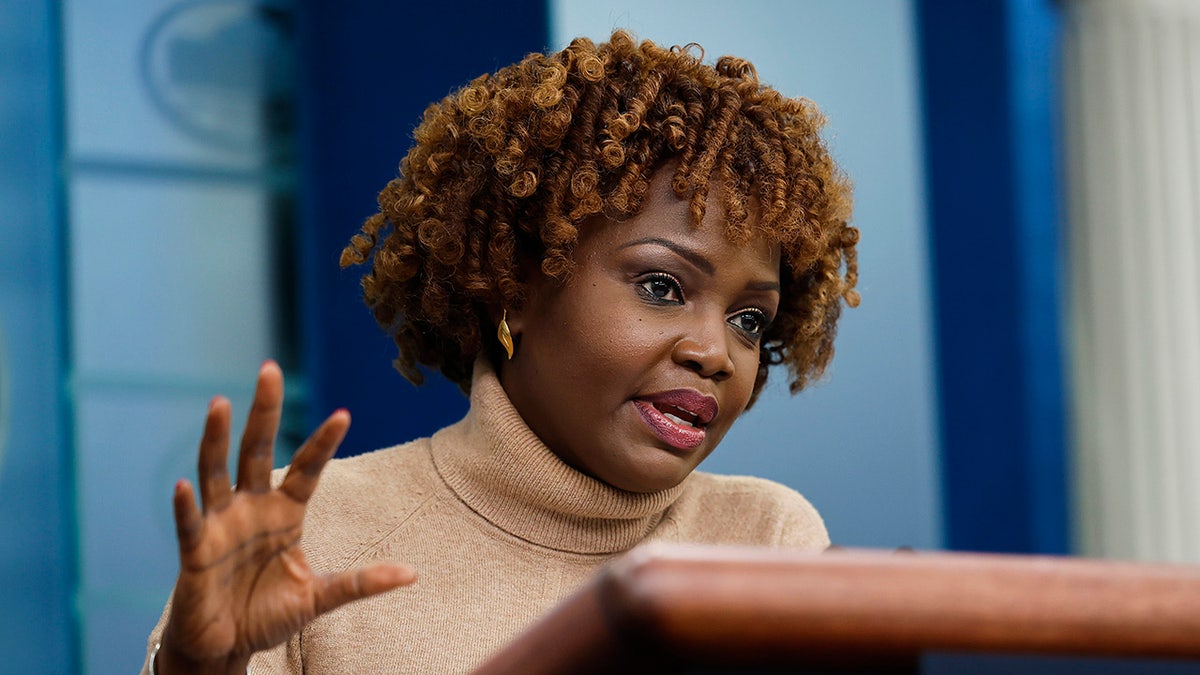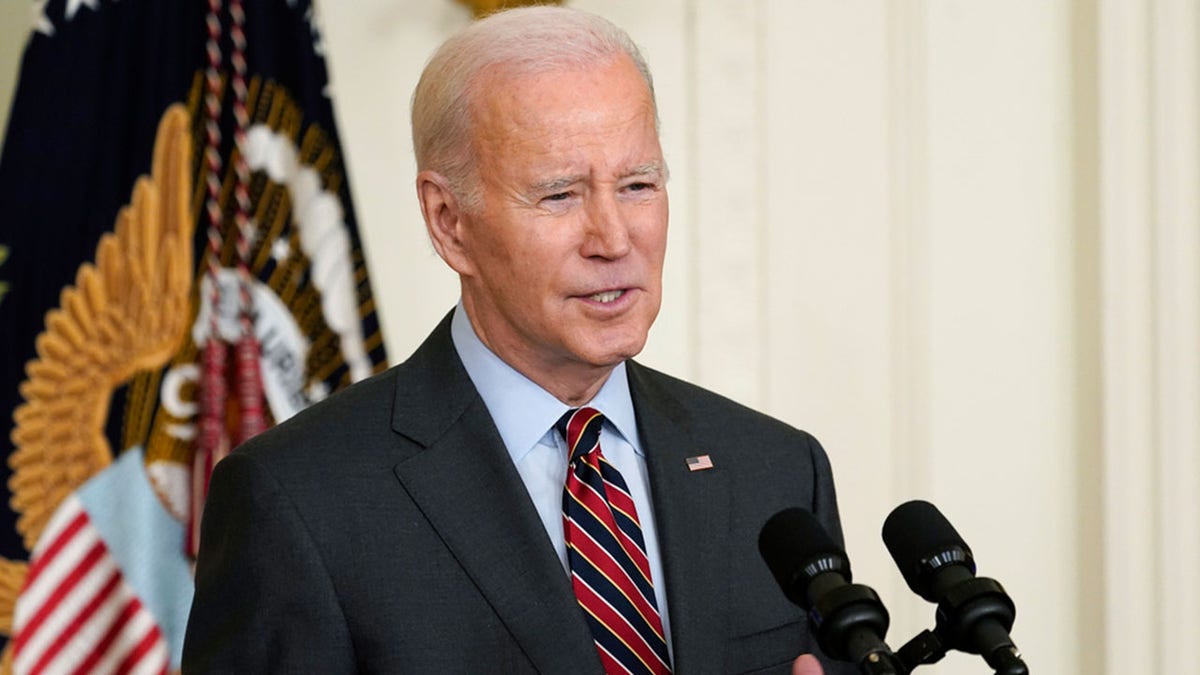White House responds to concerns about AI development
Fox News' Peter Doocy questions White House press secretary Karine Jean-Pierre about preparations over fears artificial intelligence will outpace humans.
The White House remains largely on the sidelines of what has become a growing debate among Americans and lawmakers about the rapid developments being made in the artificial intelligence (AI) industry and whether there should be some type of congressional intervention.
Fielding questions from the briefing room on Thursday, White House press secretary Karine Jean-Pierre did not say whether the Biden administration would urge lawmakers to federally regulate AI after she was asked by Fox News White House correspondent Peter Doocy about an open letter, which was signed by Tesla CEO Elon Musk, Apple co-founder Steve Wozniak and other tech giants, that cited AI's "profound risks to society and humanity."
"It highlights a number of challenges addressed directly in the administration's blueprint for an AI bill of rights, which was released last October," Jean-Pierre said of the letter. "It includes principles and practices AI creators can use to ensure protections related to safety, civil rights, civil liberties are integrated into AI systems from start to finish."
"Right now, there's a comprehensive process that is underway to ensure a cohesive federal government approach to AI-related risks and opportunities, including how to ensure that AI innovation and deployment proceeds with appropriate prudence and safety foremost in mind," she added. "I don't have anything else to announce at this point, at this time, but there is a comprehensive process in place."
BIDEN ADMIN SILENT AMID GROWING CONCERN FROM LAWMAKERS OVER RAPID DEVELOPMENT OF AI TECHNOLOGY

White House press secretary Karine Jean-Pierre talks to reporters during the daily news conference at the White House on Thursday. (Chip Somodevilla / Getty Images)
Doocy pressed Jean-Pierre on the seriousness of the matter and cited comments made by Eliezer Yudkowsky, a decision theorist at the Machine Intelligence Research Institute, who wrote in a recent op-ed that the six-month "pause" on developing "AI systems more powerful than GPT-4" — as called for by Musk and hundreds of other innovators and experts — understates the "seriousness of the situation." He would go further by implementing a moratorium on new large AI learning models that is "indefinite and worldwide."
"Many researchers steeped in these issues, including myself, expect that the most likely result of building a superhumanly smart AI, under anything remotely like the current circumstances, is that literally everyone on Earth will die," Yudkowsky said. "Not as in 'maybe possibly some remote chance' but as in 'that is the obvious thing that would happen.'"
"Would you agree that does not sound good?" Doocy asked Jean-Pierre of Yudkowsky's claim.
"Your delivery, Peter, it's quite something," Jean-Pierre responded with a laugh.
"It sounds crazy, but is it?" Doocy asked.
"All I can say is that there's a comprehensive process in place. We put out a blueprint back in October, as you know," she said in response. "I don't have anything to share. We have seen the letter. We understand what their concerns are. Again, comprehensive process — we're gonna let that flow."
Doocy then asked Jean-Pierre whether President Biden is "worried that artificial intelligence could become self-aware."
"Look, we are — again, there is a comprehensive process," she said. "We are taking this very seriously. … I just don't want to get ahead of our findings and what that's going to look like, but it is a cohesive federal government approach to AI-related risks as you just laid out in a very dramatic way."

Jean-Pierre said Thursday that the open letter from Elon Musk and other tech experts "highlights a number of challenges" featured in the White House's October 2022 Blueprint for an AI Bill of Rights. (Chip Somodevilla / Getty Images)
"We're going to move on. But thank you, Peter, for the drama," Jean-Pierre added.
The Blueprint for an AI Bill of Rights — as referenced by Jean-Pierre during the briefing — was published by the White House Office of Science and Technology Policy in October and is a "set of five principles and associated practices to help guide the design, use, and deployment of automated systems to protect the rights of the American public in the age of artificial intelligence."
The five principles featured in the blueprint include: safe and effective systems; algorithmic discrimination protections; data privacy; notice and explanation; and human alternatives, consideration and fallback.
When reached for comment about the issue and whether the White House has concern over the rapid development of AI or believes it should be federally regulated, Jean-Pierre referred Fox News Digital to the National Security Council (NSC), which serves as Biden's "principal forum for considering national security and foreign policy matters with his or her senior advisers and cabinet officials."
Despite signaling that it would respond rapidly to Fox News' request, after more than 24 hours, the NSC did not provide comment on the Biden administration's reaction to the call for an AI development moratorium.

President Biden speaks during an event in the East Room of the White House in Washington, D.C., on Monday. (AP Photo / Alex Brandon)
CLICK HERE TO GET THE FOX NEWS APP
The relative silence from the White House over potentially disruptive developments in AI comes as lawmakers from both sides of the aisle in the 118th Congress appear to be finding common ground in calling for oversight of the burgeoning technology.
"I think what you have to do is to identify what is not allowed in terms of ethics and illegal activities, whether it is AI or not. You impose on AI activities the same level of ethics and privacy that you do for other competencies today," South Dakota GOP Sen. Mike Rounds, a leader of the Senate AI Caucus, told Fox News Digital on Wednesday.
Sen. Gary Peters, D-Mich., said the Senate Homeland Security and Governmental Affairs Committee, which he chairs, recently held a hearing on the "pros and cons" of AI technology.
"I intend to have a series of hearings in Homeland Security and [Governmental] Affairs taking up AI and what we should be thinking about," Peters said.
Fox News' Chris Pandolfo contributed to this report.






















